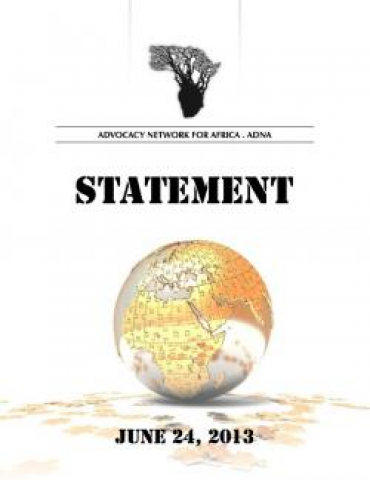
A new statement by the Africa Advocacy Network (ADNA) -- which includes the Maryknoll Office for Global Concerns -- is critical of the Obama administration’s policy toward Africa and calls for a new approach to trade and investment, militarization, agriculture and land policy, and more in the region.
The statement, dated June 24, 2013, three days before President Obama's visit to Senegal, South Africa and Tanzania, spotlights four points of concern from members of ADNA:
1. Militarization of U.S. policy toward Africa: We are opposed to the Western focus on building larger, more politically powerful, more technologically-equipped, and more expensive militaries in African countries. This reflects a policy based on a belief - and on a habit - that military solutions are the first step toward peace. Military responses to conflict and contestation are often counter-productive in the long term and result in gross violations of human rights and deaths of civilians. ...
2. Food, agricultural investment, land grabs: President Obama’s trip to Africa comes one year after announcing the New Alliance for Food Security and Nutrition at the 2012 G8 Summit. The President’s stop in Tanzania will draw attention to this cooperation between private companies and governments. However, this alliance is not the anti-poverty “alliance” it claims to be because it turns away from the G8 commitments of $22 billion in public investment in agriculture made at L’Aquila in 2009 in response to the 2008 food crisis. Instead of maintaining and expanding public investment, the New Alliance rolls public sector investment together with those of the large private agribusiness sector as if the two are similar in effect. ...
3. Climate change: Climate change is one of the greatest obstacles to ending poverty and one of the gravest equity challenges of our time. Impoverished countries have done least to create the climate crisis, yet are being hit first and worst by its impacts, including extreme weather events, sea-level rise, drought, and disruption of water and food supplies. Poor countries and communities have the least capacity to deal with such impacts. Africa is one of the continents that will be most affected by climate change, and food production will be particularly threatened. According to the Intergovernmental Panel on Climate Change (IPCC), in some countries in Africa, yields from rain-fed agriculture could be reduced by up to 50 percent by 2020 as a result of climate change. This will mean increased hunger and famines across an already food insecure continent. Water resources across Africa will also be severely impacted; by 2020, 75-250 million people across Africa could face more severe water shortages due to climate change. ...
4. Financial integrity and economic development: We believe the United States should seek to promote greater financial transparency and integrity among African stakeholders, U.S. investors in African projects and in their transactions with the rest of the world. ...
Read the entire statement in its PDF format (attached below).
